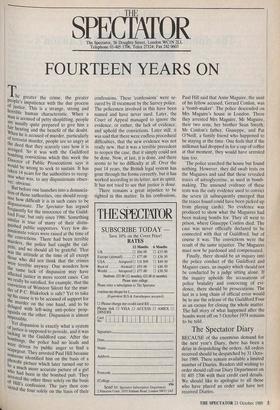The Spectator, 56 Doughty Street, London WC1N 2LL Telephone 01-405
1706; Telex 27124; Fax 242 0603
FOURTEEN YEARS ON
of justice. This is a strange, strong and horrible human characteristic. When a man is accused of petty shoplifting, people are usually quite prepared to give him a fair hearing and the benefit of the doubt. When he is accused of murder, particularly of terrorist murder, people are so angry at
the deed that they scarcely care how it is avenged. So it was with the Guildford bombing convictions which this week the Director of Public Prosecutions says it would be wrong to seek to sustain. It has taken 14 years for the authorities to recog-
nise what was, to any dispassionate obser- ver, obvious. But before one launches into a denuncia- tion of those authorities, one should recog-
nise how difficult it is in such cases to be dispassionate. The Spectator has argued frequently for the innocence of the Guild-
ford Four, but only since 1986. Something similar is true of many of their distin-
guished public supporters. Very few dis- Passionate voices were raised at the time of the convictions. There had been terrible murders, the police had caught the cul-
prits, and we should all be grateful. That was the attitude at the time of all except those who did not think that the crimes were terrible anyway. One wonders how the same lack of dispassion may have affected justice in more recent cases. Can we really be satisfied, for example, that the
conviction of Winston Silcott for the mur- der ,. of P.C. Blakelock is safe? Yet to take
"P his cause is to be accused of support for the murder on the one hand, and to be deluged with left-wing anti-police prop-
aganda on the other. Dispassion is almost impossible.
Yet dispassion is exactly what a system lacking Justice is supposed to provide, and it was 1,acking in the Guildford case. After the
bombings, the police had no leads and were driven by public anger to find a scapegoat. They arrested Paul Hill because someone identified him on the basis of a photofit picture which later turned out to
be a much more accurate picture of a girl
who had been in the bombed pub. They arrested the other three solely on the basis of Hill's confession. The jury then con- victed the four solely on the basis of their confessions. These 'confessions' were se- cured by ill treatment by the Surrey police. The policemen involved in this have been named and have never sued. Later, the Court of Appeal managed to ignore the evidence, or rather, the lack of evidence, and uphold the convictions. Later still, it was said that there were endless procedural difficulties, that the new evidence was not really new, that it was a terrible precedent to reopen the case, that it simply could not be done. Now, at last, it is done, and there seems to be no difficulty at all. Over the past 14 years, the British legal system has gone through the forms correctly, but it has worked according to its letter, not its spirit. It has not tried to see that justice is done.
There remains a great injustice to be righted in this matter. In his confessions, Paul Hill said that Anne Maguire, the aunt of his fellow accused, Gerard Conlon, was a 'bomb-maker'. The police descended on Mrs Maguire's house in London. There they arrested Mrs Maguire, Mr Maguire, their two sons, her brother Sean Smyth, Mr Conlon's father, Giuseppe, and Pat O'Neill, a family friend who happened to be staying at the time. One feels that if the milkman had dropped in for a cup of coffee at that moment, they would have arrested him too.
The police searched the house but found nothing. However, they did swab tests on the Maguires and said that these revealed traces of nitroglycerine, as used in bomb- making. The unsound evidence of these tests was the only evidence used to convict the seven (it subsequently emerged that the traces found could have been picked up from playing cards). No evidence was produced to show what the Maguires had been making bombs for. They all went to prison, where Giuseppe Conlon died. The case was never officially declared to be connected with that of Guildford, but of course it was. The convictions were the result of the same injustice. The Maguires must now be pardoned and compensated.
Finally, there should be an inquiry into the police conduct of the Guildford and Maguire cases, an inquiry which should not be conducted by a judge sitting alone. If the inquiry upholds the accusations of police brutality and concocting of evi- dence, there should be prosecutions. The last in a long chain of official error would be to use the release of the Guildford Four as an excuse for closing the whole matter. The full story of what happened after the bombs went off on 5 October 1974 remains to be told.


























































 Previous page
Previous page